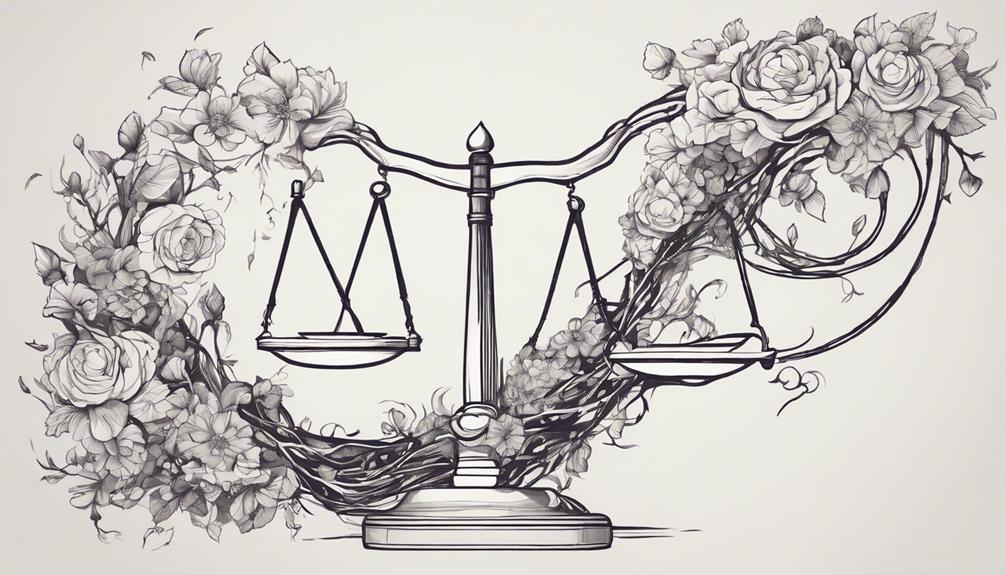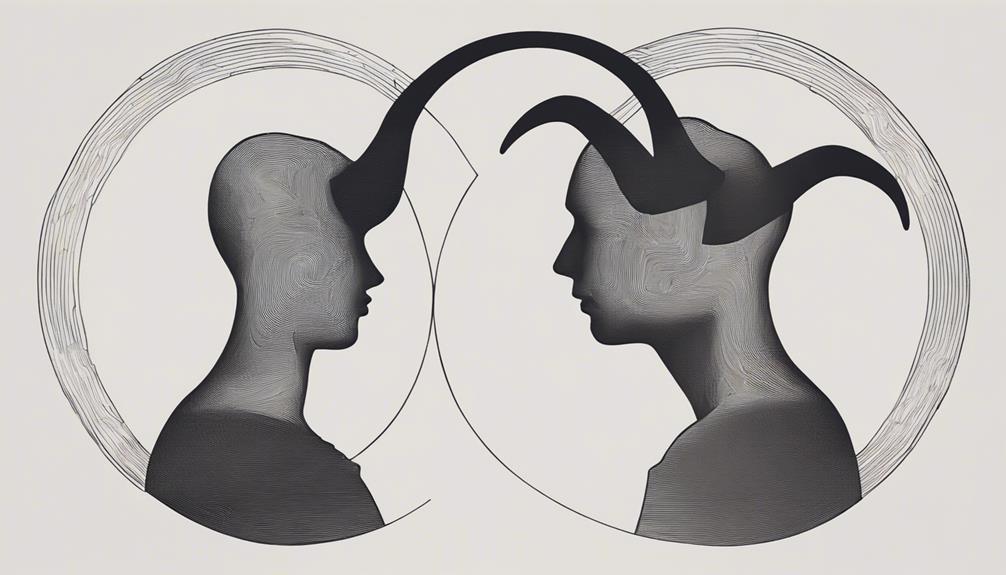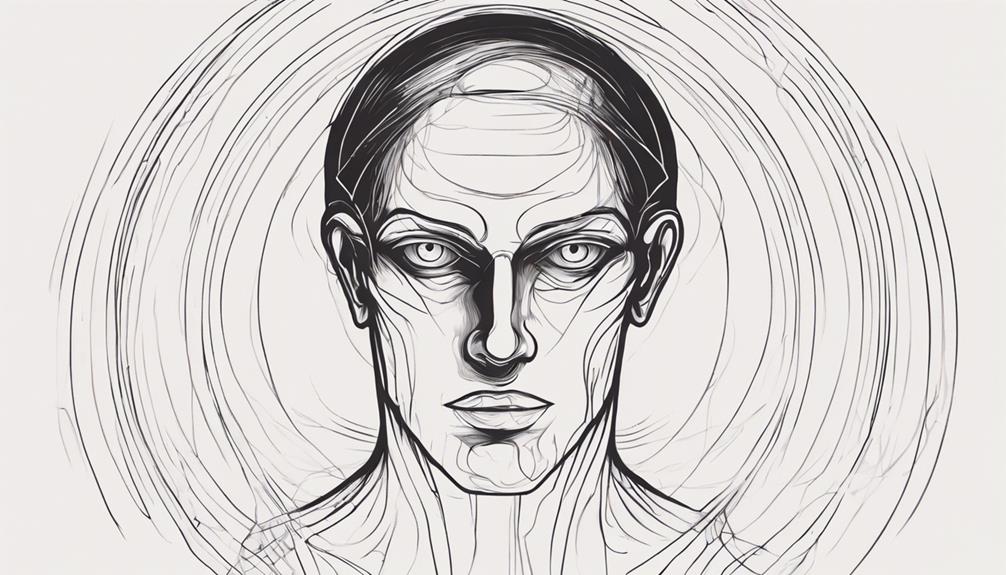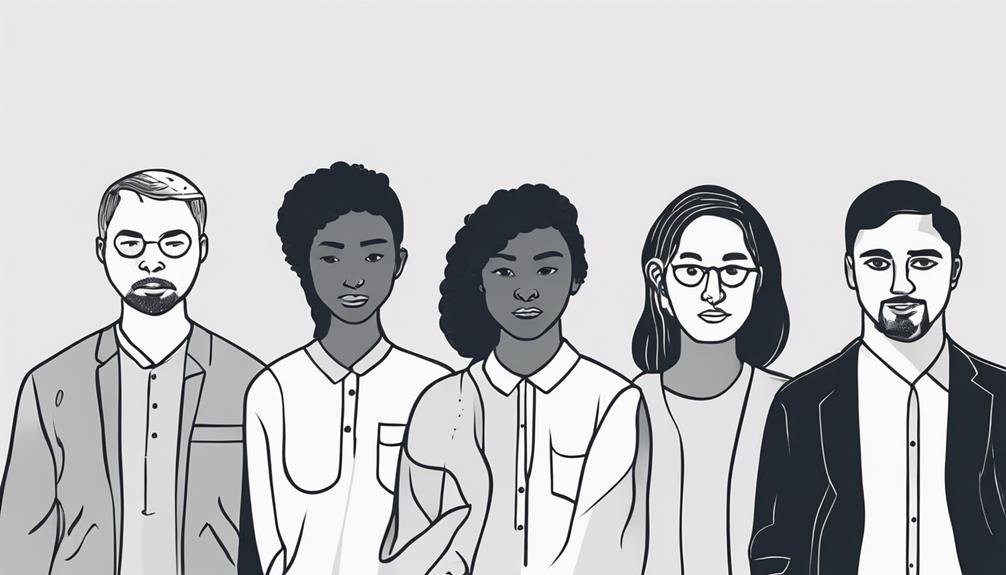The age-old question of whether humans are inherently good or evil continues to captivate the minds of scholars and thinkers alike. As we navigate through various philosophical, psychological, and scientific perspectives, the complexity of human nature unfolds in intricate layers. From the moral values instilled at an early age to the influence of culture and evolutionary biology, the debate on human morality offers a profound insight into our understanding of self and society. Join the exploration of this fundamental inquiry as we delve deeper into the intricate web of human nature.
Key Takeaways
- Moral values are influenced by societal factors, upbringing, and cultural norms.
- Humans exhibit a dynamic interplay of good and evil tendencies.
- Philosophical theories offer contrasting perspectives on human nature.
- Evolutionary biology suggests humans possess the capacity for both goodness and evil.
The Concept of Morality in Humans

The concept of morality in humans is a multifaceted construct shaped by societal influences, individual upbringing, and intrinsic ethical considerations. Morality is learned through a complex interplay of societal factors, starting from early childhood experiences and continuing throughout one's life. Upbringing plays a pivotal role in instilling moral values, as children absorb norms and principles from their families, communities, and educational institutions. As individuals mature, they navigate their moral compass through personal choices that are influenced by both external factors and internal reflections on ethical principles.
Ethical principles form the foundation of morality, guiding individuals in distinguishing between right and wrong actions. These principles are often subject to philosophical debates that delve into the origins and complexities of moral values. Such debates offer insights into the diverse perspectives on morality and contribute to a deeper understanding of human nature and behavior within society. Ultimately, the concept of morality reflects a dynamic and evolving aspect of human existence, shaped by a combination of learned behaviors, societal norms, and individual moral reasoning.
Origins of Moral Values
Moral values have been intricately woven into the fabric of human societies, evolving over time to foster social harmony and cooperation. The origins of these values can be linked to early human communities, where adherence to shared norms was crucial for group survival. Cultural influences continue to shape and perpetuate these moral values, highlighting the complex interplay between biology, society, and individual beliefs.
Moral Values Formation
From cultural norms to personal experiences, the formation of moral values encompasses a diverse array of influences. Family upbringing plays a crucial role in instilling moral values and ethical beliefs in individuals. Parents serve as initial moral guides, shaping behavior through teachings and role modeling. Educational institutions further contribute to moral values formation by integrating ethics into curricula and fostering a sense of social responsibility. Religious institutions offer moral guidance and ethical frameworks based on spiritual teachings, influencing believers' moral compass. Personal experiences, interactions, and exposure to diverse perspectives also mold moral values over time, allowing individuals to adapt and refine their ethical beliefs. The convergence of these influences shapes an individual's moral character and guides their actions in society.
Cultural Influences on Values
Cultural influences intricately interweave with individual belief systems, shaping the genesis of moral values. These influences stem from societal norms, religious doctrines, and historical legacies that mold our understanding of good and evil. Different cultures offer diverse perspectives on morality, reflecting their unique values and ethical standards. The impact of cultural influences on values extends to ethical decision-making processes, guiding individuals in navigating complex moral dilemmas. By examining how cultural norms shape moral values, we gain a deeper understanding of the intricate tapestry that forms human morality. Recognizing the role of cultural influences in shaping ethical frameworks is essential for comprehending the multifaceted nature of human nature and the interplay between individual beliefs and societal values.
Debate on Human Nature

The debate on human nature centers on the fundamental question of whether humans are inherently good or evil, exploring the complexities of moral tendencies and innate qualities. Philosophical perspectives, theological beliefs, and psychological theories contribute to contrasting viewpoints on this enduring debate. Through critical analysis of these diverse viewpoints, a deeper understanding of human nature and the factors influencing moral behavior can be achieved.
Good Vs Evil
Humans' inherent inclination towards good or evil is a longstanding philosophical debate that delves into the core of human nature. This debate is complex and multifaceted, drawing on various perspectives from philosophers, theologians, and scientists. Here are some key points to consider:
- Philosophers' Views: Philosophers like Rousseau and Kant argue that humans are inherently good but can be influenced by society.
- Theological Perspective: Traditional Christian theology, with the concept of original sin, suggests humans are naturally inclined to sin and need divine guidance to be good.
- Scientific Findings: Scientific studies show that babies exhibit a preference for shapes displaying helpful and selfless behavior, indicating an early inclination towards goodness.
These contrasting viewpoints contribute to the ongoing discourse on whether humans are fundamentally good or evil.
Inherent Nature Debate
The centuries-old discourse surrounding the inherent nature of human beings prompts a critical examination of fundamental ethics and morality. The debate on whether humans are naturally good or born with inherent evil tendencies has been a topic of contemplation for philosophers throughout history. Philosophers like Rousseau and Kant argue that society can lead individuals away from their inherent goodness, while traditional Christian theology suggests a natural inclination towards sin due to the concept of original sin. This dichotomy of humans being either inherently good or evil people challenges the idea of a moral blank slate at birth. The complexity of human nature and morality continues to be debated by philosophers, with scientific studies indicating an innate tendency towards goodness in humans from a young age.
| Humans are naturally good | Humans are born good |
|---|---|
| Philosophical Perspective | Theological Belief |
| Society's Influence | Original Sin Concept |
| Scientific Studies | Ongoing Debate |
Human Moral Tendencies
Within the discourse surrounding human moral tendencies, an ongoing debate persists regarding the innate nature of individuals' ethical inclinations. When considering whether human beings are born good or evil, it is crucial to examine the interplay between innate tendencies and societal influences. Here are three key points to consider:
- Innate Virtues: Studies on infants demonstrate a preference for altruistic behavior, suggesting an inherent tendency towards goodness from a young age.
- Societal Influences: Philosophers like Rousseau and Kant argue that societal norms and influences can either nurture or corrupt individuals' inherent moral tendencies.
- Moral Tendencies: The debate on human nature revolves around whether humans possess intrinsic virtues or if external factors shape their moral compass, challenging the notion of inherent evil.
Psychological Perspectives on Morality

Psychological research offers compelling insights into the innate moral inclinations of individuals, particularly evident from a young age through studies on altruistic behavior and moral decision-making. Developmental psychology research has shown that even infants exhibit a preference for individuals displaying altruistic actions. For instance, studies have demonstrated that infants as young as seven months old show a preference for shapes or puppets that engage in helpful and selfless behavior. Research conducted at Yale University and Kyoto University further supports these findings, confirming that infants have a natural inclination towards altruism. The Big Mother Study from Harvard and other similar experiments consistently observe altruistic behavior in babies, indicating that this tendency is not isolated but rather a widespread phenomenon among young individuals. These studies collectively emphasize the presence of innate goodness in humans, suggesting that moral inclinations may be intrinsic and develop from a very early stage in life.
Philosophical Theories on Good and Evil
From a philosophical standpoint, divergent perspectives on the inherent nature of humanity shed light on the intricate interplay between good and evil within human existence. Various philosophers throughout history have presented contrasting views on whether humans are naturally good or evil.
- Thomas Hobbes: Hobbes believed that humans are inherently selfish and brutal, suggesting that without societal structures and control, individuals would exist in a constant state of conflict and chaos.
- Jean-Jacques Rousseau: In contrast to Hobbes, Rousseau argued that humans are born inherently good and compassionate but can be corrupted by societal influences that promote inequality and injustice.
- Sigmund Freud: Freud delved into the complexities of human psychology, proposing that individuals harbor both conscious and unconscious desires that may include darker impulses, indicating a more nuanced view of human nature.
These philosophical perspectives on good and evil contribute to a deeper understanding of the dualistic nature of humanity, reflecting on the ongoing debate regarding whether humans are naturally inclined towards goodness or if evil tendencies are inherent.
Cultural Influences on Morality

Cultural influences play a pivotal role in shaping individuals' moral beliefs and guiding their ethical decision-making processes. Norms, values, and traditions within a culture serve as the foundation upon which moral standards are constructed and behaviors are evaluated. The diversity of cultures worldwide leads to variations in moral frameworks and ethical perspectives, highlighting the significance of cultural context in understanding human morality.
Societal structures and historical events within a culture also significantly impact the development of moral beliefs. These elements shape the collective consciousness and influence the moral narratives that are passed down through generations. Additionally, cultural narratives and myths play a crucial role in reinforcing moral teachings and ethical principles, providing individuals with a framework through which they interpret and navigate their moral decisions.
Ethics and Human Behavior
In exploring the intricate relationship between ethics and human behavior, it becomes evident that fundamental aspects of morality are deeply ingrained within the fabric of human nature. The following facts shed light on the natural inclination towards goodness in human behavior:
- Research demonstrates that babies as young as seven months exhibit a preference for shapes displaying helpful and selfless behavior, indicating an innate sense of morality from an early age.
- Developmental psychology studies consistently show that infants choose puppets based on their actions rather than other variables, suggesting a predisposition towards moral behavior.
- Studies conducted by institutions like Yale University and Kyoto University confirm infants' preference for altruistic behavior, with observations of such tendencies in various research projects such as the Big Mother Study by Harvard researchers. These findings collectively point towards a natural inclination towards moral and altruistic behavior in humans, challenging the notion of inherent evil within our species.
Evolutionary Biology and Morality

Exploring the intersection of evolutionary biology and morality unveils intriguing insights into the inherent social tendencies of humans and their behavioral complexities. Humans are not born as inherently good or evil but rather as amoral creatures with the capacity for both. Evolutionary biology suggests that humans have a propensity for good, as evidenced by strong tendencies towards social cooperation, surpassing most other primates. However, this innate goodness can be overshadowed by the corruption of greed, leading to destructive conflicts and wars globally.
Studies on bonobos, a primate species with low social aggression levels similar to humans, provide valuable insights into our evolutionary past and the importance of social relationships in shaping moral behavior. While life forms, including humans, may display inherent selfishness, mutual benefit can also be observed in plant communities, indicating the complexity of moral behavior in evolutionary terms. The need for society and rules arises from the human capability of passing moral judgments, highlighting the intricate interplay between evolutionary biology and morality.
Frequently Asked Questions
Is Human Nature Originally Good or Evil?
The debate over whether human nature is originally good or evil persists, with diverse perspectives from philosophy, psychology, and anthropology. This ongoing inquiry delves into the interplay of nature vs. nurture, moral development, and cultural influences on shaping human behavior. Exploring ethical implications and psychological perspectives, scholars like Aristotle, Freud, Hobbes, Rousseau, and Xunzi offer contrasting views. Understanding the complexities of human nature requires a multidisciplinary approach that transcends simplistic dichotomies.
Are Humans Naturally Good Naturally Evil or Neither?
In the discourse surrounding whether humans are naturally good, evil, or neither, the debate delves into the intricate balance of nature versus nurture, moral development, social conditioning, and philosophical perspectives. Exploring the ethical implications and psychological insights, it becomes evident that human behavior is influenced by a myriad of factors. Understanding the interplay of genetics, environment, and personal choices is crucial in comprehending the complexity of human morality.
Are Human Beings Inherently Good?
While the philosophical debate surrounding whether human beings are inherently good persists, studies suggest a moral compass guiding us towards altruistic tendencies. Empathy development in early life and observations of innate goodness in infants point towards human potential for kindness. Despite complexities, evidence leans towards a natural inclination towards goodness within humanity. Understanding these aspects can shed light on the internal mechanisms that drive our actions towards compassion and ethical behavior.
Who Said Humans Are Inherently Evil?
Thomas Hobbes, a prominent figure in philosophical discourse, asserted that humans are inherently evil. His viewpoint underscores a belief in self-interest and the pursuit of power, resulting in a perpetual state of conflict. This perspective has influenced political philosophy and discussions on governance. Hobbes' assertion necessitates a strong central authority to curb chaos. The debate on human nature's dark facets continues to shape societal implications, moral dilemmas, and psychological studies on human behavior.
Conclusion
In conclusion, the debate on whether humans are inherently good or evil continues to perplex scholars and researchers alike. While some argue for the innate virtues of humanity, others point to darker impulses and taboo tendencies. The complexity of human nature is a multifaceted inquiry that challenges traditional notions of morality and ethics. Ultimately, the question of human nature remains a profound and enigmatic puzzle that captivates the minds of thinkers across various disciplines.
